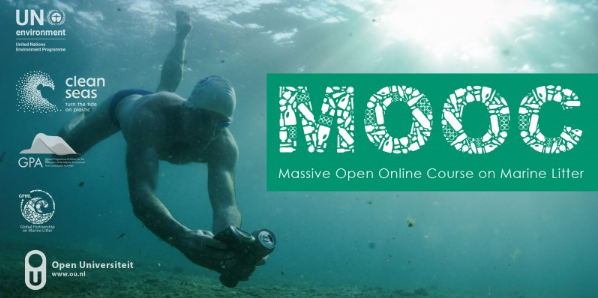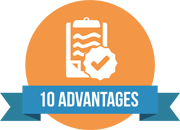
MOOC on Marine Litter- 3rd ed.
Description
UN Environment and the Open University have created a Massive Open Online Course (MOOC) on Marine Litter. It is part of Clean Seas and contributes to the goals of the Global Partnership on Marine Litter.
Marine litter is a global problem that affects every ocean of the world. Litter is an environmental, human health and socio-economic problem that is a symptom of a highly disposable society. With worldwide growth in the amount of solid litter thrown away every day and slow rates of degradation, the amount of litter present in the marine environment is increasing.
The MOOC on marine litter strives to teach students through action oriented learning how they can apply successful and inspiring activities to their own local context, regardless of their profession or location. The course will present different options and tools to combat marine pollution such as the use of effective and legitimate tools like the Honolulu Strategy. The course will provide examples and case studies that will inspire leadership at all levels, thereby increasing awareness of and stimulating creative solutions to marine litter problems. Moreover, this course will benefit policymakers, practitioners, and managers who wish to connect with other professionals in order to enhance their knowledge of marine litter issues.
The course is available in all UN languages and Portuguese.
Marine litter is a global problem that affects every ocean of the world. Litter is an environmental, human health and socio-economic problem that is a symptom of a highly disposable society. With worldwide growth in the amount of solid litter thrown away every day and slow rates of degradation, the amount of litter present in the marine environment is increasing.
The MOOC on marine litter strives to teach students through action oriented learning how they can apply successful and inspiring activities to their own local context, regardless of their profession or location. The course will present different options and tools to combat marine pollution such as the use of effective and legitimate tools like the Honolulu Strategy. The course will provide examples and case studies that will inspire leadership at all levels, thereby increasing awareness of and stimulating creative solutions to marine litter problems. Moreover, this course will benefit policymakers, practitioners, and managers who wish to connect with other professionals in order to enhance their knowledge of marine litter issues.
The course is available in all UN languages and Portuguese.
Course format
Leadership Track: 10 hours of learning introducing the student to the basic characteristics and concepts of the marine litter
issue and various strategies to prevent and reduce marine litter. This track consists of 2 blocks geared towards policymakers,
managers and professionals who require an overview of the topic in order to integrate the concepts of the MOOC into their
professions. Students are encouraged to complete this track whether or not they are an official leader.
Expert Track: 30 additional hours consisting of 6 blocks (of which the student will follow at least 4) and a final assignment for
professionals and students who want to acquire more in-depth knowledge, insights and skills relating to prevention of marine
litter. Students undertaking the Expert Track must also complete the Leadership Track for a total of 40 hours of instruction.
The MOOC will start 29 April 2019 with the Leadership Track taking place over a course of 2 weeks. Those students who wish
to remain in the course will continue to the Expert Track, which will be completed by August (total of 8 weeks).
issue and various strategies to prevent and reduce marine litter. This track consists of 2 blocks geared towards policymakers,
managers and professionals who require an overview of the topic in order to integrate the concepts of the MOOC into their
professions. Students are encouraged to complete this track whether or not they are an official leader.
Expert Track: 30 additional hours consisting of 6 blocks (of which the student will follow at least 4) and a final assignment for
professionals and students who want to acquire more in-depth knowledge, insights and skills relating to prevention of marine
litter. Students undertaking the Expert Track must also complete the Leadership Track for a total of 40 hours of instruction.
The MOOC will start 29 April 2019 with the Leadership Track taking place over a course of 2 weeks. Those students who wish
to remain in the course will continue to the Expert Track, which will be completed by August (total of 8 weeks).
Prerequisites
In order to complete this MOOC, you will need:
- A computer that is connected to the Internet.
- Time: you will be working approximately 4-5 hrs per week on the MOOC. The Leadership takes 2 weeks and the Expert
Track 8 weeks. Each track is concluded with a final assignment, which takes approximately 2 hrs for the Leadership
Track and 8 hrs for the Expert Track.
- The course is taught at bachelor’s level. This implies that you will need some general knowledge of the world around
you, e.g. basic knowledge about biology, chemistry, physics, economics and the social sciences. If you have completed
high school, you should be fine.
- The course is taught in English. You will not only need to understand English, but also be able to read, speak and write
in the English language.
- Collaborative skills: you will be working together with other students.
- Motivation and engagement.
- A computer that is connected to the Internet.
- Time: you will be working approximately 4-5 hrs per week on the MOOC. The Leadership takes 2 weeks and the Expert
Track 8 weeks. Each track is concluded with a final assignment, which takes approximately 2 hrs for the Leadership
Track and 8 hrs for the Expert Track.
- The course is taught at bachelor’s level. This implies that you will need some general knowledge of the world around
you, e.g. basic knowledge about biology, chemistry, physics, economics and the social sciences. If you have completed
high school, you should be fine.
- The course is taught in English. You will not only need to understand English, but also be able to read, speak and write
in the English language.
- Collaborative skills: you will be working together with other students.
- Motivation and engagement.
Information
| Language |
English |
| Start date | 29 April 2019 |
| Duration | 8 weeks |
| Hours of study | 40 hours |
| Recognition |
|
| EQF-Level | EQF level 6 - Bachelor's Degree |
|
|
Open license: (re-)use it |
|
|
Free admittance |
|
|
Free of charge |
|
|
Learn anywhere online |
|
|
Quality assured |
| Massive | Massive |
| Full Course Experience | Full course experience |
| Provider | OpenupEd |
18-Apr-2019
MOOC on Marine Litter- 3rd ed.
https://www.ou.nl/-/unenvironment-mooc-marine-litter
UN Environment and the Open University have created a Massive Open Online Course (MOOC) on Marine Litter. It is part of Clean Seas and contributes to the goals of the Global Partnership on Marine Litter.
Marine litter is a global problem that affects every ocean of the world. Litter is an environmental, human health and socio-economic problem that is a symptom of a highly disposable society. With worldwide growth in the amount of solid litter thrown away every day and slow rates of degradation, the amount of litter present in the marine environment is increasing.
The MOOC on marine litter strives to teach students through action oriented learning how they can apply successful and inspiring activities to their own local context, regardless of their profession or location. The course will present different options and tools to combat marine pollution such as the use of effective and legitimate tools like the Honolulu Strategy. The course will provide examples and case studies that will inspire leadership at all levels, thereby increasing awareness of and stimulating creative solutions to marine litter problems. Moreover, this course will benefit policymakers, practitioners, and managers who wish to connect with other professionals in order to enhance their knowledge of marine litter issues.
The course is available in all UN languages and Portuguese.
Marine litter is a global problem that affects every ocean of the world. Litter is an environmental, human health and socio-economic problem that is a symptom of a highly disposable society. With worldwide growth in the amount of solid litter thrown away every day and slow rates of degradation, the amount of litter present in the marine environment is increasing.
The MOOC on marine litter strives to teach students through action oriented learning how they can apply successful and inspiring activities to their own local context, regardless of their profession or location. The course will present different options and tools to combat marine pollution such as the use of effective and legitimate tools like the Honolulu Strategy. The course will provide examples and case studies that will inspire leadership at all levels, thereby increasing awareness of and stimulating creative solutions to marine litter problems. Moreover, this course will benefit policymakers, practitioners, and managers who wish to connect with other professionals in order to enhance their knowledge of marine litter issues.
The course is available in all UN languages and Portuguese.
English
Instructor-paced
29-04-2019
8
40
Open University of the Netherlands
https://www.ou.nl/web/english/home
[{"file":"\/images\/institution_logos\/OUNL.png","params":"{\"rotation\":0,\"scale\":100,\"imagedim\":{\"x\":200,\"y\":200,\"w\":200,\"h\":100},\"cropdim\":{\"x\":200,\"y\":200,\"w\":200,\"h\":100},\"crop\":true,\"mainimagedim\":{\"x\":200,\"y\":200,\"w\":200,\"h\":100}}"}]
- Formal certificate available
Leadership Track: 10 hours of learning introducing the student to the basic characteristics and concepts of the marine litter
issue and various strategies to prevent and reduce marine litter. This track consists of 2 blocks geared towards policymakers,
managers and professionals who require an overview of the topic in order to integrate the concepts of the MOOC into their
professions. Students are encouraged to complete this track whether or not they are an official leader.
Expert Track: 30 additional hours consisting of 6 blocks (of which the student will follow at least 4) and a final assignment for
professionals and students who want to acquire more in-depth knowledge, insights and skills relating to prevention of marine
litter. Students undertaking the Expert Track must also complete the Leadership Track for a total of 40 hours of instruction.
The MOOC will start 29 April 2019 with the Leadership Track taking place over a course of 2 weeks. Those students who wish
to remain in the course will continue to the Expert Track, which will be completed by August (total of 8 weeks).
issue and various strategies to prevent and reduce marine litter. This track consists of 2 blocks geared towards policymakers,
managers and professionals who require an overview of the topic in order to integrate the concepts of the MOOC into their
professions. Students are encouraged to complete this track whether or not they are an official leader.
Expert Track: 30 additional hours consisting of 6 blocks (of which the student will follow at least 4) and a final assignment for
professionals and students who want to acquire more in-depth knowledge, insights and skills relating to prevention of marine
litter. Students undertaking the Expert Track must also complete the Leadership Track for a total of 40 hours of instruction.
The MOOC will start 29 April 2019 with the Leadership Track taking place over a course of 2 weeks. Those students who wish
to remain in the course will continue to the Expert Track, which will be completed by August (total of 8 weeks).
In order to complete this MOOC, you will need:
- A computer that is connected to the Internet.
- Time: you will be working approximately 4-5 hrs per week on the MOOC. The Leadership takes 2 weeks and the Expert
Track 8 weeks. Each track is concluded with a final assignment, which takes approximately 2 hrs for the Leadership
Track and 8 hrs for the Expert Track.
- The course is taught at bachelor’s level. This implies that you will need some general knowledge of the world around
you, e.g. basic knowledge about biology, chemistry, physics, economics and the social sciences. If you have completed
high school, you should be fine.
- The course is taught in English. You will not only need to understand English, but also be able to read, speak and write
in the English language.
- Collaborative skills: you will be working together with other students.
- Motivation and engagement.
- A computer that is connected to the Internet.
- Time: you will be working approximately 4-5 hrs per week on the MOOC. The Leadership takes 2 weeks and the Expert
Track 8 weeks. Each track is concluded with a final assignment, which takes approximately 2 hrs for the Leadership
Track and 8 hrs for the Expert Track.
- The course is taught at bachelor’s level. This implies that you will need some general knowledge of the world around
you, e.g. basic knowledge about biology, chemistry, physics, economics and the social sciences. If you have completed
high school, you should be fine.
- The course is taught in English. You will not only need to understand English, but also be able to read, speak and write
in the English language.
- Collaborative skills: you will be working together with other students.
- Motivation and engagement.
For more information about the EFQ levels click here
EQF level 6 - Bachelor's Degree
Ansje Löhr, Heidi Savelli, Aaron Vuola, Ad Ragas, Marco Kalz, Raoul Beunen, Frank van Belleghem, Carolien Kroeze, Charlotte Verburg, Dave Huitema, Judith Floor
1. Select an image to upload (add files)
2. Click 'start upload'
3. Set the crop settings by clicking on four arrows icon.
4. Drag the crop area and zoom or rotate the image if needed.
2. Click 'start upload'
3. Set the crop settings by clicking on four arrows icon.
4. Drag the crop area and zoom or rotate the image if needed.


Always online
Massive
Full Course Experience
OpenupEd
- 0
Open University of the Netherlands
2025-12-28 08:32:59


